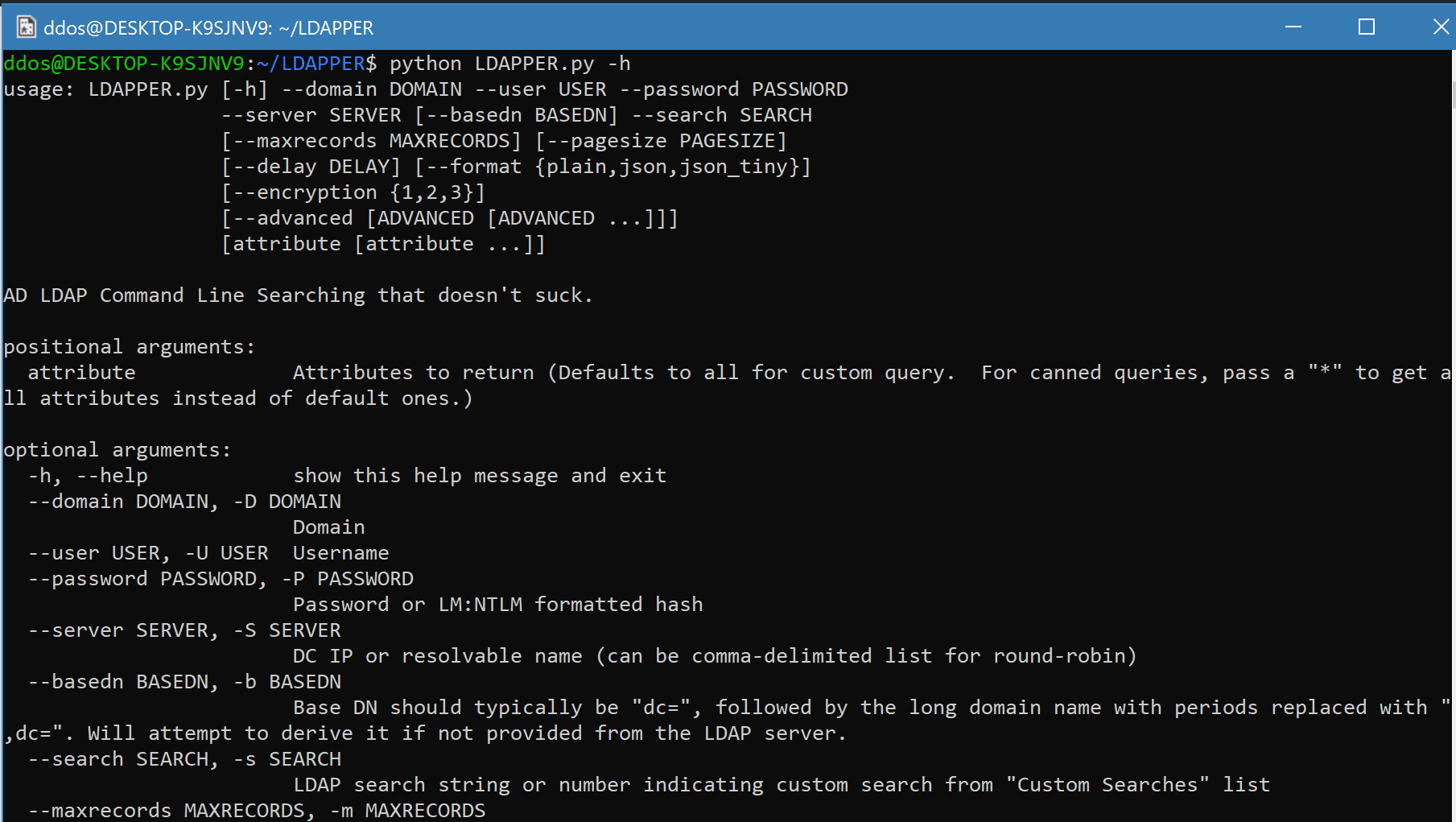LDAPPER
This tool was written to address a lot of the issues I was experiencing with ldapsearch and AD interaction in general. In particular, this tool addresses the following problems that I’ve experienced:
- Inability to return more than a thousand results from an AD. This tool supports LDAP record paging and works around other AD bugs to allow an arbitrary number of records to be retrieved.
- Inability to use NTLM credentials in an intuitive fashion to authenticate. While you still have to provide the baseDN, you can provide the NetBIOS domain name, username, and password to authenticate to a Windows DC.
- Inability to precisely control the number of returned records, the speed at which they are returned, and the number of records pulled at a time. This tool allows you to control all of these items, including adding delays between each paged call. In addition, multiple DC’s can be specified for round-robining querying.
- Inability to return the results in easily digestible forms. This tool currently supports three formats:
- plain: A nice, readable, text version of the data with sub-items tabbed in.
- json: JSON output, with extra white space for easy readability.
- json_tiny: JSON output with all extra whitespace stripped.
- Inability to return only attributes you care about. This tool allows you to either return all attributes or return only the ones you want.
- Inability to have a list of pre-baked, commonly used queries, saved.
Install
git clone https://github.com/shellster/LDAPPER.git
pip install -r requirements.txt
Use
# python LDAPPER.py
usage: LDAPPER.py [-h] --domain DOMAIN --user USER --password PASSWORD
--server SERVER [--basedn BASEDN] --search SEARCH
[--maxrecords MAXRECORDS] [--pagesize PAGESIZE]
[--delay DELAY] [--format {plain,json,json_tiny}]
[--encryption {1,2,3}]
[--advanced [ADVANCED [ADVANCED ...]]]
[attribute [attribute ...]]
AD LDAP Command Line Searching that doesn't suck.
positional arguments:
attribute Attributes to return (defaults to all)
optional arguments:
-h, --help show this help message and exit
--domain DOMAIN, -D DOMAIN
Domain
--user USER, -U USER Username
--password PASSWORD, -P PASSWORD
Password or LM:NTLM formatted hash
--server SERVER, -S SERVER
DC IP or resolvable name (can be comma-delimited list for round-robin)
--basedn BASEDN, -b BASEDN
Base DN should typically be "dc=", followed by the long domain name with periods replaced with ",dc=". Will attempt to derive it if not provided, via DNS.
--search SEARCH, -s SEARCH
LDAP search string or number indicating custom search from "Custom Searches" list
--maxrecords MAXRECORDS, -m MAXRECORDS
Maximum records to return (Default is 100), 0 means all.
--pagesize PAGESIZE, -p PAGESIZE
Number of records to return on each pull (Default is 10). Should be <= max records.
--delay DELAY, -d DELAY
Millisecond delay between paging requests (Defaults to 0).
--format {plain,json,json_tiny}, -f {plain,json,json_tiny}
Format of output (Default is "plain"), can be: plain, json. json_tiny
--encryption {1,2,3}, -n {1,2,3}
3) Connect to 636 TLS (Default); 2) Connect 389 No TLS, but attempt STARTTLS and fallback as needed; 1) Connect to 389, Force Plaintext
--advanced [ADVANCED [ADVANCED ...]], -a [ADVANCED [ADVANCED ...]]
Advanced way to pass options for canned searches that prompt for additional input (for multiple prompts, pass argument in the order of prompting)
Custom Searches:
1) Get all users
1.1) Get specific user (You will be prompted for the username)
2) Get all groups (and their members)
2.1) Get specific group (You will be prompted for the group name)
3) Get all printers
4) Get all computers
4.1) Get specific computer (You will be prompted for the computer name)
5) Get Domain/Enterprise Administrators
6) Get Domain Trusts
7) Search for Unconstrained SPN Delegations (Potential Priv-Esc)
8) Search for Accounts where PreAuth is not required. (ASREPROAST)
9) Search for User SPNs (KERBEROAST)
9.1) Search for specific User SPN (You will be prompted for the User Principle Name)
*10) Show All LAPS LA Passwords (that you can see)
*11) Search for common plaintext password attributes (UserPassword, UnixUserPassword, unicodePwd, and msSFU30Password)
12) Show All Quest Two-Factor Seeds (if you have access)
13) Oracle "orclCommonAttribute" SSO password hash
*14) Oracle "userPassword" SSO password hash
Starred items have never been tested in an environment where they could be verified, so please let me know if they work.
Example
For the purposes of these examples, assume the following:
NETBIOS NAME: EMP
FULL DOMAIN NAME: EXAMPLE.LOCAL
DC IPs: 10.0.0.2, 10.0.0.3
USERNAME: bob
PASSWORD: password
Retrieve all records return only the CN attribute:
python LDAPPER.py -D 'EMP' -U 'bob' -P 'password' -S '10.0.0.2,10.0.0.3' -b 'DC=EXAMPLE,DC=LOCAL' -m 0 -s '(cn=*)' cn
Retrieve details about a specific user (will be prompted for username):
python LDAPPER.py -D 'EMP' -U 'bob' -P 'password' -S '10.0.0.2,10.0.0.3' -b 'DC=EXAMPLE,DC=LOCAL' -m 0 -s '1.1'
Retrieve details about a specific user (pass username so you don’t get prompted):
python LDAPPER.py -D 'EMP' -U 'bob' -P 'password' -S '10.0.0.2,10.0.0.3' -b 'DC=EXAMPLE,DC=LOCAL' -m 0 -s '1.1' -a 'alice'
Retrieve top 100 user Kerberos SPNs, no more than five at a time, with two seconds between each page request in compact JSON form:
python LDAPPER.py -D 'EMP' -U 'bob' -P 'password' -S '10.0.0.2,10.0.0.3' -b 'DC=EXAMPLE,DC=LOCAL' -m 100 -p 5 -d 2000 -f json_tiny -s '(&(objectcategory=user)(serviceprincipalname=*))' serviceprincipalname userprincipalname
Manually retrieve all records for printers and show all related attributes:
python LDAPPER.py -D 'EMP' -U 'bob' -P 'password' -S '10.0.0.2,10.0.0.3' -b 'DC=EXAMPLE,DC=LOCAL' -m 0 -s '(objectClass=printQueue)'
Search for Unconstrained SPN Delegations with no effort:
python LDAPPER.py -D 'EMP' -U 'bob' -P 'password' -S '10.0.0.2,10.0.0.3' -b 'DC=EXAMPLE,DC=LOCAL' -m 0 -s 4
Copyright (c) 2017 shellster
Source: https://github.com/shellster/






